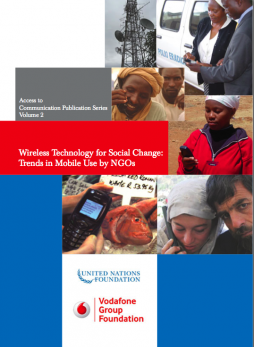social change
Posted by MohiniBhavsar on Jun 29, 2010
Networked Activism data sheet 1322 Views
Abstract:
The same technologies that groups of ordinary citizens are using to write operating systems and encyclopedias are fostering a quiet revolution in another area - social activism. On websites such as Avaaz.org and Wikipedia, citizens are forming groups to report on human rights violations and organize email writing campaigns, activities formerly the prerogative of professionals. This article considers whether the participatory potential of technology can be used to mobilize ordinary citizens in the work of human rights advocacy.
Existing online advocacy efforts reveal a de facto inverse relationship between broad mobilization and deep participation. Large groups mobilize many individuals, but each of those individuals has only a limited ability to participate in decisions about the group’s goals or methods. Thus, although we currently have the tools necessary for individuals to engage in advocacy without the need for professional organizations, we are still far from realizing an ideal of fully decentralized, user-generated activism.
Drawing on the insights of network theory, the article proposes a model of “networked activism” that would help ensure both deep participation and broad mobilization by encouraging the formation of highly participatory small groups while providing opportunities for those small groups to connect with one another. Drawing on a series of interviews with human rights and other civil society organizations, the article recommends specific design elements that might foster a model of networked activism. The article concludes that although online activism is unlikely to replace some of the functions served by human rights organizations, efforts to create synergies between traditional and online efforts have the potential to provide avenues for real, meaningful, and effective citizen participation in human rights advocacy.
Posted by SteveWolak on Dec 21, 2009
The Betavine Social Exchange project has taken a step foward today by launching the "Chembe Challenge". The winner will receive a US $5,000 prize and the chance of a further US $5,000 to deploy the solution in the local market.
The Chembe Challenge is all about finding mobile solutions to personal security concerns in urban areas of Africa. The challenge is hosted on the Betavine Social Exchange and anyone can propose a solution but Chembe require that a local partner is engaged in the solution from Kenya, Mozambique, South Africa or Tanzania.
The Betavine Social Exchange seeks to bring together people in the community with ICT challenges and mobile developers or local entrepreneurs that can help solve those challenges. It is important that the solutions have a local link and the way to deploy the solution locally is clear and planned.
| Betavine Urban Security Challenge data sheet 2175 Views |
| Global Regions: |
|
| Countries: |
South Africa
|
Posted by KatrinVerclas on Nov 20, 2008
The Vodafone Americas Foundation has a new Wireless Innovation Challenge to promote innovation and increase implementation of advanced wireless related technology for a better world. The foundation is providing $600,000 in awards to support projects "of
exceptional promise." The Challenge is open to projects from universities and nonprofit organizations based in the United States.
Projects must demonstrate a multi-disciplinary approach that uses innovation in wireless related technology to address a critical global issue in one or more of the following areas: access to communication, education, economic development, environment, or health. The
technology should have the potential for replication and large scale impact. Teams should have a business plan or a basic framework for financial sustainability and rollout. Submissions deadline is February 2, 2009.
Posted by sharakarasic on Nov 19, 2008
On day three of MobileActive ’08, I attended a session led by engineer Blaine Cook, formerly Twitter’s Chief Architect.
Cook summarized what the group was looking for:
“We would like an ongoing, up-to-date tool. A migration tool that keeps us moving from one social network to the next so NGO’s can move and migrate from platform to platform. We need the ability for any one organization to connect with any other organization.”
Mixit was mentioned as a useful tool, but Cook noted cross-border interoperability issues: Mixit requires GPRS which isn’t that credible across borders. Using a SIM card costs a lot to text across borders. Cook suggested that there could be a network where you send to SIM chip in Uganda from Uganda, but set up a network with nodes to dramatically cut costs of cross-border activism.
Cook said that it costs around $20,000-30,000 for a short code in the US and you can send as many SMS’s as you like. He mentioned that Twitter got a bill for $37,000 in Egypt for only 6000 Twitter users.
Posted by KatrinVerclas on Apr 29, 2008
Mobile technology is transforming the way advocacy, development and relief organizations accomplish their institutional missions. This is nothing new to readers of MobileActive. Our recent report Wireless Technology for Social Change: Trends in NGO Mobile Use, released today by the United Nations Foundation and The Vodafone Group Foundation, brings this point home.
Wireless Technology for Social Change: Trends in NGO Mobile Use was written by Sheila Kinkade (ShareIdeas.org) and Katrin Verclas (MobileActive.org), and commissioned by the United Nations Foundation-Vodafone Group Foundation Technology Partnership. The report examines emerging trends in “mobile activism” by looking at 11 case studies of groups active in the areas of public health, humanitarian assistance and environmental conservation.
